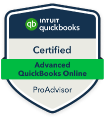
Just as an architect returns to the art of building to reinforce their design foundations, an accounting professional can benefit tremendously from grounding themselves in the basics of bookkeeping.
Bookkeeping is the bedrock of all financial management, providing the structure and day-to-day numbers needed to make sound financial decisions. Whether you’re just entering the accounting world or you’re a veteran looking to boost your expertise, bookkeeping training can reconnect you with the foundational skills that support more complex accounting concepts.
In this blog, we talk about how the right bookkeeping online training can give you the required bookkeeping skills for a successful career.
Why Bookkeeping Training?
Builds a Strong Foundation in Financial Principles
Fundamentally, bookkeeping covers essential principles that extend to every accounting role. As an accounting professional, you deal with the broader scope of financial management – from interpreting and analyzing to reporting financial data. With more complex processes, it can be easy to overlook the role that accurate record-keeping plays in supporting these efforts.
Refreshing your knowledge with bookkeeping training might be the key to revitalizing your accounting practices, improving accuracy, and strengthening your overall financial acumen.
Enhances Attention to Detail
As an accountant, you already know that even a minor error can have significant repercussions, leading to hours of finding where the blip is. Bookkeeping training emphasizes meticulous accuracy and teaches techniques to ensure error-free record-keeping.
Because accountants deal with the overarching financial statements, going back to bookkeeping knowledge of journals, ledgers, and transaction reports can help you reconnect with these foundational elements.
Improves Understanding of Accounting Software
Modern cloud accounting relies heavily on software solutions like QuickBooks, FreshBooks, and Xero. Many bookkeeping online training offers hands-on training with these programs, helping you understand how they can transform your accounting processes.
By refreshing your knowledge and getting comfortable with these technologies, you might be able to find ways to improve your financial reporting and decision-making.
Prepare You for Higher-Level Accounting Roles
Bookkeeping training goes beyond data entry. It introduces you to financial analysis, forecasting, and budgeting skills that can propel you toward more complex roles. With a solid foundation in these areas, you’re better positioned to succeed as a Certified Public Accountant (CPA) or Certified Management Accountant (CMA).
Boosts Earning Potential and Career Flexibility
The demand for skilled bookkeepers is high, especially among small businesses and startups that need accurate record-keeping but may not require a full-time accountant. With the right bookkeeping online training, you can offer bookkeeping services as a freelancer, gaining another avenue for earning potential and flexibility in your career.
Different Types of Bookkeeping Training
Certificate and Diploma Programs
These are your traditional, structured programs offered by colleges, universities, and vocational schools, often spanning a few months to a year. They cover fundamental bookkeeping concepts, accounting principles, and financial reporting.
- Best For: Beginners as well as professionals seeking formal qualifications.
- Examples: Certificates in Bookkeeping, Diploma in Accounting and Bookkeeping.
E-Learning Platforms
Many platforms, like Coursera, Udemy, and LinkedIn Learning, offer online bookkeeping courses you can complete at your own pace. These courses range from beginner to advanced levels and often cover specialized topics.
- Best For: Self-directed learners or those looking to learn specific skills, like using QuickBooks or Excel for bookkeeping.
- Examples: QuickBooks Certification, Xero Accounting Software courses, “Fundamentals of Bookkeeping” courses.
Bookkeeping Online Training
These take the e-learning platform to another level with focused, hands-on training sessions that can be customized to what you need. They’re often designed to teach specific skills or software tools and are taught by experienced bookkeeping professionals.
- Best For: Professionals who want to quickly upskill in a particular area or those wanting personalized, hands-on training in real-time.
- Examples: Accounting By Sal Corp. Bookkeeping Academy
Software-Specific Bookkeeping Online Training
Specialized training courses focus on popular accounting software such as QuickBooks, Xero, FreshBooks, and Sage. These courses teach users how to manage transactions, generate reports, and organize data within specific platforms.
- Best For: Anyone who needs proficiency in specific bookkeeping software to meet job requirements or wants to improve efficiency.
- Examples: Accounting By Sal Corp. QuickBooks Training, Accounting By Sal Corp. FreshBooks Training, QuickBooks ProAdvisor program, Xero Advisor Certification,
Continuing Education Workshops and Seminars
These are typically offered by professional organizations and focus on updating bookkeepers on the latest industry changes, tax laws, and software updates. They’re often short-term and provide Continuing Professional Education (CPE) credits.
- Best For: Established bookkeepers or accountants who need to stay updated on industry developments or maintain certification.
- Examples: Tax law update seminars, and advanced Excel workshops for accountants.
Skills You Need For a Successful Bookkeeping Career
Basic Accounting Knowledge
Before delving into bookkeeping, it’s crucial to have a strong understanding of the fundamentals of accounting. Beyond the basics such as debits and credits, assets and liabilities, and revenue and expenses, be sure to familiarize yourself with concepts like:
- Accrual
- Consistency
- Conservatism
- Matching
- Materiality
- Cost
- Revenue Recognition
- Going Concern
The Generally Accepted Accounting Principles (GAAP) are standard across the US and Canada; however, some international countries use the International Financial Reporting Standards (IFRS). Accounting principles are the rules and guidelines that accountants, companies, and other bodies must follow when reporting financial data. These standards make it easier to examine financial data and improve the quality of the information reported by businesses and individuals.
Proficiency With Bookkeeping Software
In the digital age, bookkeeping software has revolutionized how businesses manage their financial data. Today’s bookkeepers must be proficient in popular accounting software, such as QuickBooks, FreshBooks, or Xero. These tools:
- Streamline data entry
- Automate repetitive tasks
- Generate insightful reports
- Improve efficiency
- Integration bank accounts and payment gateways
- Offer robust reporting capabilities
- Allow users to access their financial data from anywhere with an Internet connection
- Ensure data security through encryption, user access controls, and regular backups
- Can accommodate businesses as they scale
- Adhere to tax regulations and accounting standards
- Integrate with other business tools and e-commerce platforms
Bookkeepers who are successful in their careers know how to navigate cloud accounting well and often take advantage of continued bookkeeping training with QuickBooks and FreshBooks software.
Data Entry and Accuracy
Accurate data entry is the backbone of bookkeeping. A small error can lead to cascading mistakes, potentially damaging the financial health of a business. As a bookkeeper, it’s important to adopt the following practices to ensure accuracy:
- Double-check entries
- Reconciling accounts
- Maintain organized records
- Use automation with built-in error checks
- Continued education and bookkeeping training
Organization and Time Management
Bookkeeping is a complex and detail-oriented process that deals with vast amounts of financial information. To effectively manage this data, bookkeepers must possess strong organizational skills. Organizational abilities play a pivotal role in maintaining structured records, ensuring accuracy, and facilitating easy data retrieval when needed.
Additionally, bookkeepers must possess effective time management to handle their workload efficiently, meet deadlines consistently, and avoid unnecessary stress. Organizational skills in bookkeeping means having excellent:
- Structured records
- File management
- Data accuracy
- Audit preparedness
- Communication and collaboration
Financial Reporting
A successful bookkeeper should be able to generate and interpret various financial reports. Balance sheets, income statements, cash flow statements, and aging reports are some of the essential reports that offer valuable insights into a company’s financial health.
It’s not enough to simply pull up or print out these reports but be able to analyze them with an eye for inefficiencies, trends, and potential areas for improvement. A bookkeeper increases their value with their clients when they have the ability to act as the company’s advisor on where their books and finances can be better managed.
Knowledge of Taxation
Tax compliance is a critical aspect of bookkeeping. A bookkeeper who can optimize tax deductions and credits legally will be a valuable asset to any organization. Some key points include:
- Legal obligation
- Avoiding costly penalties
- Understanding complex tax codes
- Timely tax filings
- Identifying deductions and credits
- Reducing tax risks
- Proactive tax planning
- Improving financial decision-making
- Building trust with stakeholders
- Navigating regulatory changes
Communication Skills
Effective communication is vital for a bookkeeper, especially when collaborating with other members of the finance team or clients. Clear and concise communication helps avoid misunderstandings, ensures accurate financial reporting, and fosters a cohesive work environment.
Effective communication also involves seeking feedback and engaging in constructive discussions with team members and clients. Feedback helps bookkeepers improve their processes, enhance accuracy, and deliver high-quality financial services.
Problem-Solving Abilities
Bookkeeping can present complex challenges that require problem-solving skills. A successful bookkeeper can:
- Identify discrepancies
- Resolve complex transactions
- Address data entry errors
- Manage uncertain or incomplete information
- Handle tax and regulatory challenges
- Implement streamlined processes
- Prevent future issues
- Adapt to technological advancements
- Plan strategically to make informed decisions
Continuous Learning
The financial landscape and regulatory environment are ever-evolving. To stay relevant and excel in their careers, bookkeepers must commit to continuous learning. Attending workshops, obtaining certifications, and staying informed about industry trends will enhance their expertise and make them adaptable to changing requirements.
Mastering bookkeeping skills is the cornerstone of a successful career in finance or entrepreneurship. As a bookkeeper, your role will be integral to maintaining a company’s financial health and steering it toward growth.
One of the best ways to improve your skills and get ahead is to continue your bookkeeping training with an experienced bookkeeping and accounting professional.
Get Personalized Bookkeeping Training
Ready to take your accounting skills to the next level with bookkeeping online training? With specialized training, you can gain the confidence to master essential bookkeeping principles and the cloud accounting software knowledge you need to elevate your career.
Contact us at Accounting By Sal Corp. today. We provide tailored instruction that fits your specific needs.














